Updates
Results from the Rwanda group antenatal trial published!
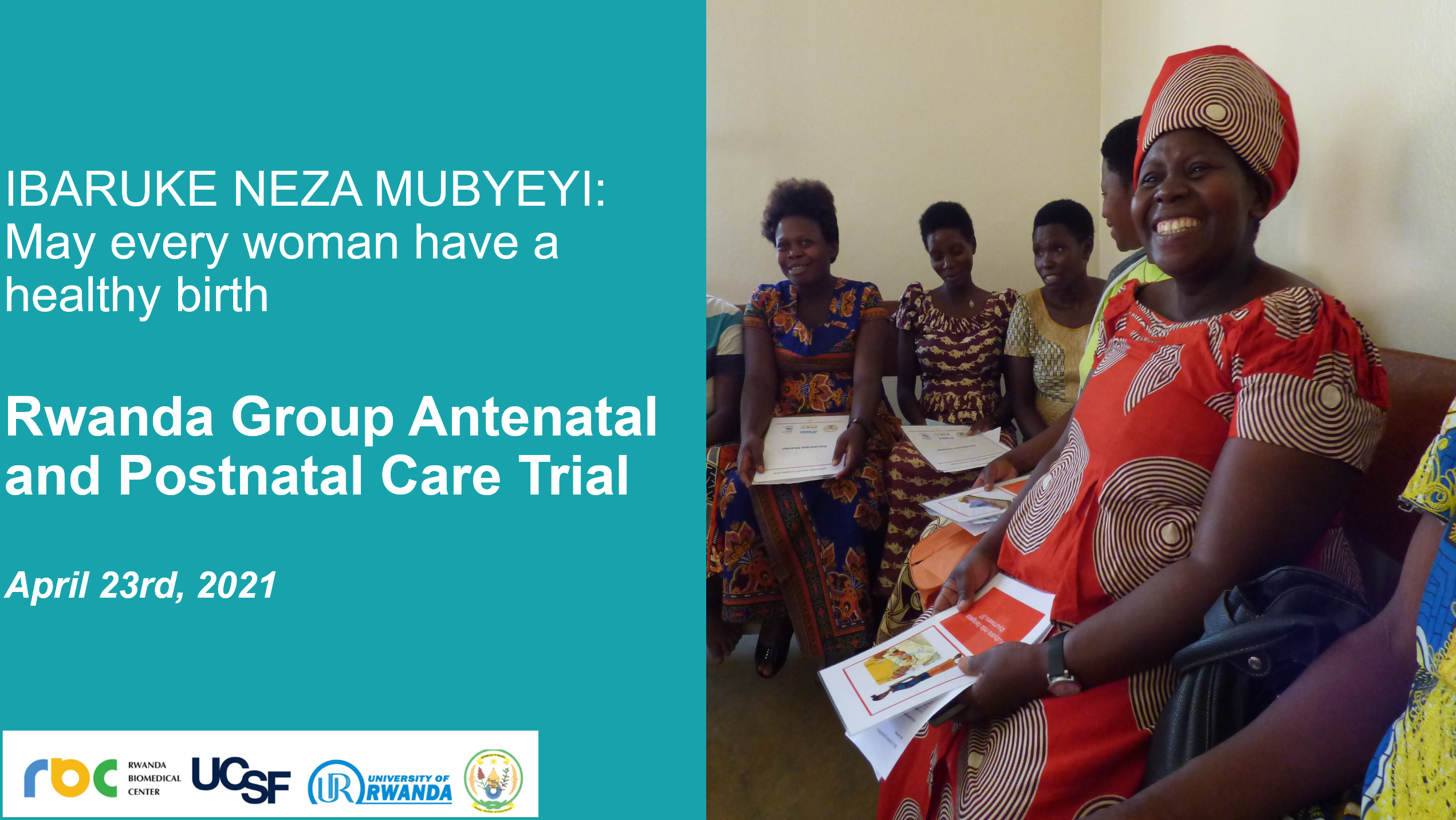 On April 23, 2021, Drs. Sabine Musange, Felix Sayinzoga and Dilys Walker presented the results from our Rwanda group antenatal trial. This session, entitled "May every woman have a healthy birth: Lessons from a group antenatal care trial in Rwanda," was moderated by Dr. Stephen Rulisa (University of Rwanda) with thoughtful reflections provided by Dr. Maurice Bucagu (World Health Organization) and Dr. Jeffrey Smith (Bill & Melinda Gates Foundation). In case you missed it, you can watch the webinar recording here!
On April 23, 2021, Drs. Sabine Musange, Felix Sayinzoga and Dilys Walker presented the results from our Rwanda group antenatal trial. This session, entitled "May every woman have a healthy birth: Lessons from a group antenatal care trial in Rwanda," was moderated by Dr. Stephen Rulisa (University of Rwanda) with thoughtful reflections provided by Dr. Maurice Bucagu (World Health Organization) and Dr. Jeffrey Smith (Bill & Melinda Gates Foundation). In case you missed it, you can watch the webinar recording here!
We also published a comprehensive study report that synthesizes the breadth of data collected from the trial, including key lessons learned and recommendations for the future of group antenatal care.
KEMRI hosts webinar in celebration of 2020 World Prematurity Day
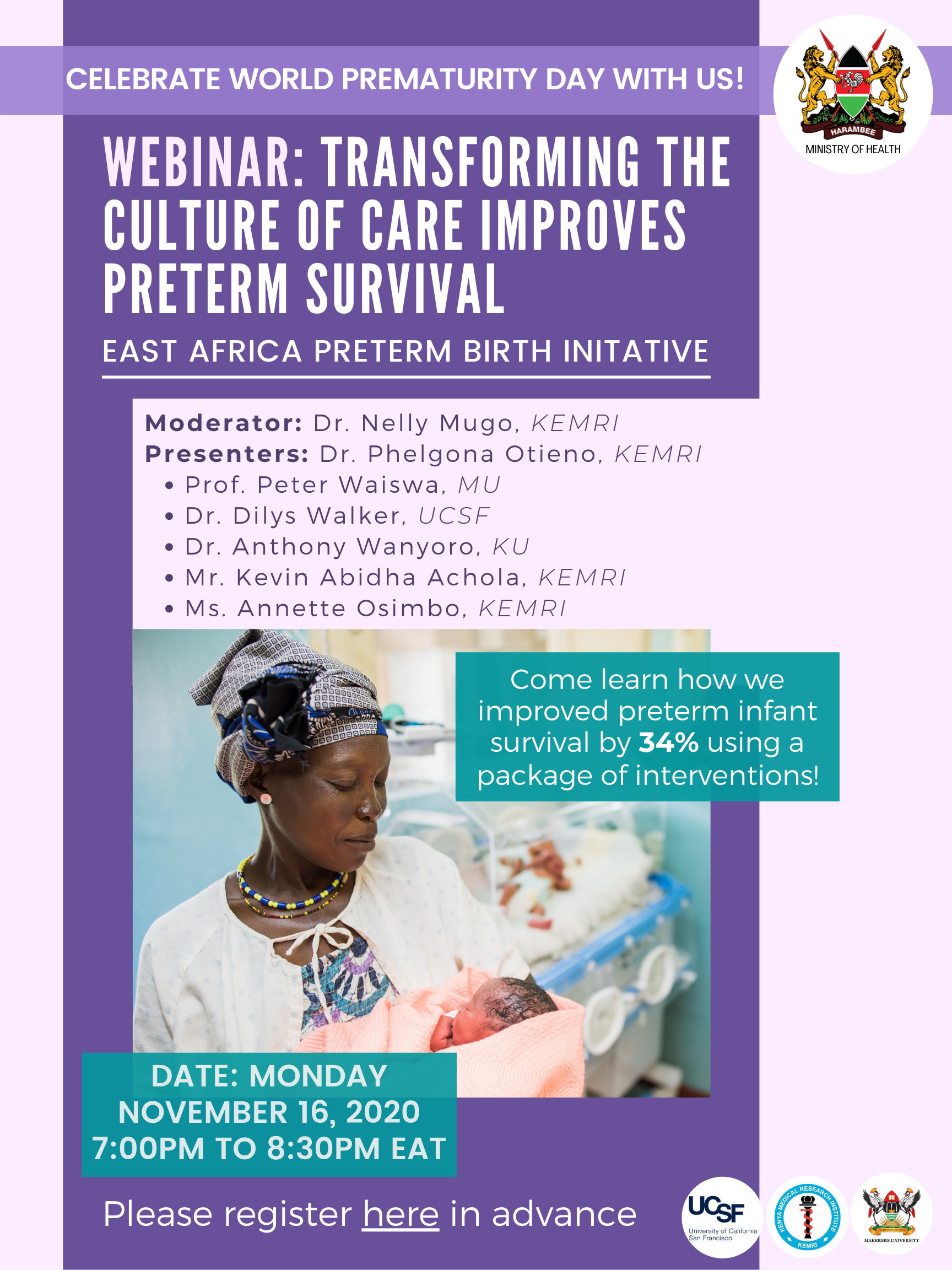 In celebration of World Prematurity Day, our partners at the Kenya Medical Research Institute (KEMRI) hosted a webinar to showcase how the PTBi facility-based intrapartum package improved the odds of preterm survival by 34%. The presentation was followed by a rich discussion regarding opportunities for intervention scale-up and sustainability. For those who were unable to attend, you can find the webinar recording here.
In celebration of World Prematurity Day, our partners at the Kenya Medical Research Institute (KEMRI) hosted a webinar to showcase how the PTBi facility-based intrapartum package improved the odds of preterm survival by 34%. The presentation was followed by a rich discussion regarding opportunities for intervention scale-up and sustainability. For those who were unable to attend, you can find the webinar recording here.
Makerere University also hosted a webinar in November 2020. The presentation was moderated by Dr. Frank Kaharuza (USAID Uganda) and included closing reflections from Dr. Jesca Nsungwa Sabiiti, the Commissioner for Maternal and Child Health at the Ministry of Health.
PTBi intrapartum package reduces stillbirth and neonatal mortality among eligible babies in Kenya and Uganda
Recently published in the Lancet Global Health, we show that study-eligible babies born in hospitals receiving the full intervention package had 34% greater odds of surviving to 28 days, compared to eligible babies born in hospitals that did not receive the intervention package. These gains in survival were seen at birth and upon discharge, as demonstrated by reduced odds of fresh stillbirth and pre-discharge mortality among eligible infants, respectively. Read our study report or watch our recent webinar for more insights and lessons learned!
Model fidelity of group antenatal and postnatal care
For a large trial of the effect of group antenatal care on perinatal outcomes in Rwanda, a Technical Working Group customized the group care model for implementation in this context. This process analysis aimed to understand the degree of fidelity with which the group antenatal care model was implemented during the trial period. Read the full article: Model fidelity of group antenatal and postnatal care: a process analysis of the first implementation of this innovative service model by the Preterm Birth Initiative-Rwanda
2019-2021 Postdoctoral Transdisciplinary Research Fellowship Cohort Announced
We are thrilled to welcome the 2019-2021 cohort to our Postdoctoral Transdisciplinary Research Fellowship! This fellowship is an extraordinary opportunity to work with world-class researchers and mentors, develop ideas and partnerships within a collaborative network, and formally build additional research skills. Our new cohort comprises Drs. April Bell, Bridgette Blebu and Mary Muhindo. Dr. Muhindo joined UCSF in September 2019 to begin her fellowship. She is studying and implementing tools that rapidly improve neonatal care in resource-limited settings. Working in collaboration with Global Strategies, she will advance her work in studying the NoviGuide, a mobile health application, in facilitating the rollout and maintenance of oxygen saturation monitoring in Tororo District Hospital, Uganda. She will also be completing advance coursework in clinical research and implementation science.
Studies Published on Group Antenatal and Postnatal Care in Rwanda
Two papers from the group antenatal care trial in Rwanda were recently published in Reproductive Health and the Journal of Global Health Reports.
The first, titled “Before and after implementation of group antenatal care (ANC) in Rwanda: a qualitative study of women’s experiences,” concluded that group antenatal and postnatal care provide compelling benefits, including increased knowledge, peer support, and better relationships with providers. Additionally, if implementing group ANC requires greater human resources at the health center and increased community outreach, those resources must be factored into any future decision to scale a group care model.
In the second study, “Postnatal care in Rwanda: facilitators and barriers to postnatal care attendance and recommendations to improve participation,” qualitative data were collected to guide development of an ANC and PNC model. The data provided evidence that postnatal care service delivery performed by community health workers, while initially not well understood, is now accepted, and valued. Furthermore, the study revealed that PNC can contribute to reductions in morbidity and mortality in mothers and newborns through support that identifies danger signs and establishes practices and referral processes.
“Discovery” Sparks Movement to Reduce Impact of Preterm Birth in East Africa
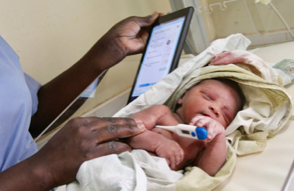 Nicole Santos, PhD, MS, manager of the East Africa Preterm Birth Initiative’s Discovery Research aim, says the program “builds capacity,” but that phrase is too modest. Truth is that PTBi-EA – and Discovery Research, in particular – is sparking a movement in Kenya, Rwanda and Uganda aimed at defeating the stubborn global epidemic of preterm birth, the largest killer of children under five.
Nicole Santos, PhD, MS, manager of the East Africa Preterm Birth Initiative’s Discovery Research aim, says the program “builds capacity,” but that phrase is too modest. Truth is that PTBi-EA – and Discovery Research, in particular – is sparking a movement in Kenya, Rwanda and Uganda aimed at defeating the stubborn global epidemic of preterm birth, the largest killer of children under five.
Consider Ugandan physician and researcher Mary Kakuru Muhindo, MBChB. Her Discovery Research-backed pilot study has given her a new and fruitful research direction, connected her with a global community of preterm birth researchers – and spawned care improvements at one hospital, which she expects to see spread to many other low-resource health care settings.
Stories of Kangaroo Mother Care
From the Daily Nation by Stanley Kimuge
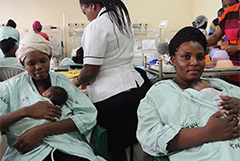 Edith Nafula, 38, had been waiting for three years to get pregnant. When she did in 2015, she had no idea that it would mark the genesis of her struggles. Her excitement was cut short, when the baby was born prematurely (one week before term) and died.
Edith Nafula, 38, had been waiting for three years to get pregnant. When she did in 2015, she had no idea that it would mark the genesis of her struggles. Her excitement was cut short, when the baby was born prematurely (one week before term) and died.
Doctors at the Webuye County Hospital said it was because of high blood pressure.
Back home, her husband and his relatives became hostile. She got pregnant again last year, but at 26 weeks, she developed complications. At 27 weeks (on November 9), she went into labour early, due to high blood pressure, and delivered through C-section at the Moi Teaching and Referral Hospital in Eldoret.
Her baby weighed 600grammes and was placed in an incubator in the neonatal intensive care unit. She named her Testimony, a reminder that anyone can overcome the harrowing experience.
Preterm Birth Symposium 2018
Through the Lens of Quality, Equity and Dignity
October 2-4, 2018
Kigali Marriott Hotel, KN 3 Avenue
Kigali, Rwanda
In 2017, the World Health Organization launched Quality Equity Dignity: A Network for Improving Quality of Care for Maternal, Newborn and Child Health which includes 10 countries with the goal to halve maternal and newborn deaths and stillbirths in health facilities within 5 years. The Network has proposed standards for improving quality of maternal and newborn care at facilities based on the WHO framework for quality which includes both the provision and experience of care.
The 2018 Preterm Birth Initiative Symposium will explore what quality, equity and dignity mean in the context of preterm birth. We will facilitate cross-collaboration between the East African and California arms of the PTBi and convene East African partners and stakeholders to explore topics such as respectful maternity care, interventions for improving quality of care, collaboration to leverage knowledge into power and quality improvements through translational research.
Attendance is by invitation only.
Speakers include:
Diane Gashumba
Rwanda Minister of Health
Alex Coutinho
UCSF Preterm Birth Initiative Strategic Advisory Board
Former Executive Director of Inshuti Mu Buzima
Manpreet Singh
Global Development Fellow
Bill & Melinda Gates Foundation
Karen Walter
Founding President and current Vice President
Council of International Neonatal Nurses
Wilson Milton Were
Medical Officer, Child Health Services
Maternal Child and Adolescent Health Department
World Health Organization
Group Antenatal Care in Rwanda: A Master Trainer’s Perspective
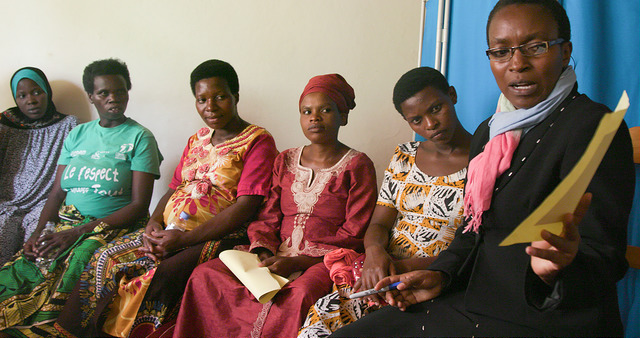 By: Tiffany Lundeen, University of California, San Francisco, East Africa Preterm Birth Initiative ; Yvonne Delphine Nsaba Uwera, University of California, San Francisco, East Africa Preterm Birth Initiative
By: Tiffany Lundeen, University of California, San Francisco, East Africa Preterm Birth Initiative ; Yvonne Delphine Nsaba Uwera, University of California, San Francisco, East Africa Preterm Birth Initiative
In 2017, the East Africa Preterm Birth Initiative (PTBi-EA) in Rwanda—a partnership among the University of California, San Francisco, the University of Rwanda, the Ministry of Health and the Rwanda Biomedical Center—launched the largest cluster randomized controlled trial ever conducted on group antenatal care. Results are expected in 2019.In the following interview, Tiffany Lundeen, a midwife on the Preterm Birth Initiative-Rwanda team based at the University of California, San Francisco who led the group care model development process, speaks with Yvonne Delphine Nsaba Uwera, a Rwandan midwife who serves as a master trainer of group care facilitators, about her observations of group care. Read the Post
